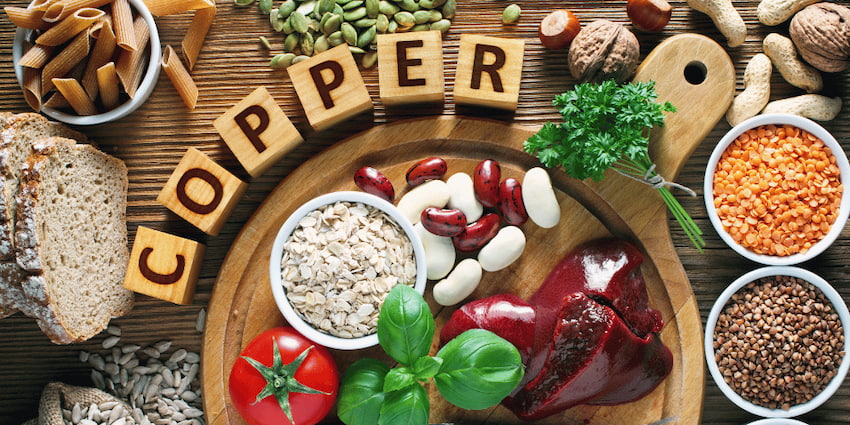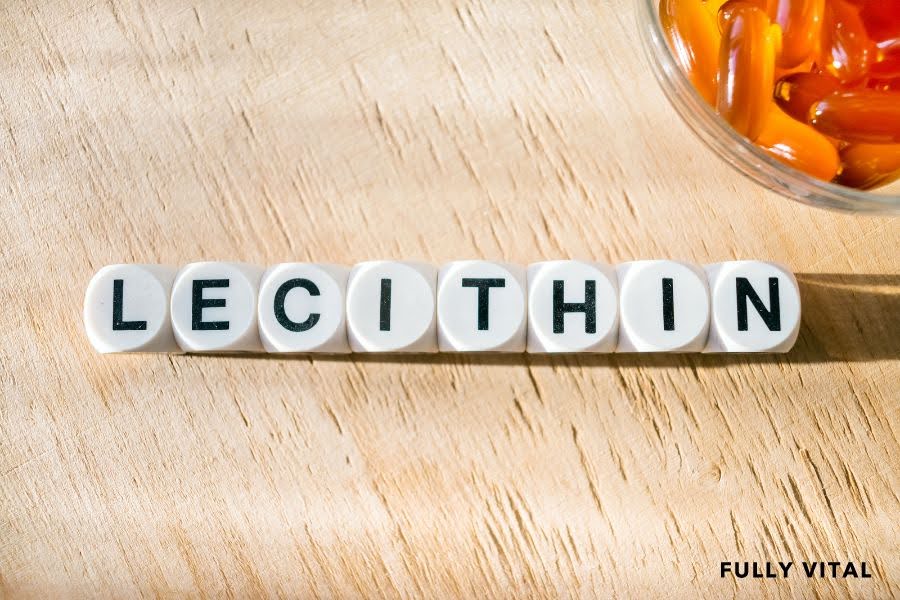
Copper: Your Hair's Natural Friend
Your hair’s health is more scientific than you might think, and copper plays a significant role in it.
Often overlooked in the shadow of other nutrients, this trace element is a key player in maintaining not only general health but also in ensuring your tresses stay strong, vibrant, and resilient.
In this article, we're not just talking about copper as a trendy hair color but we're focusing on the nutrient itself and its impact on your hair from the inside out.
To truly revitalize your hair from the inside out, consider the Fully Vital Enhance Hair Growth Serum.
This formulated serum targets the root causes of hair thinning, ensuring your locks not only look vibrant but also regain their strength and resilience.
Experience the transformation for yourself and elevate your hair care regimen with Fully Vital.

I LOVE MY HAIR NOW
FullyVital hair serum and hair vitamins made tremendous improvements in my hair. I truly love my hair now.
Shop Hair ProductsWhat Is Copper?
Copper is a trace mineral essential for the human body, playing a pivotal role in various physiological processes.
To hair, copper helps to facilitate hair growth and prevent excessive hair loss by aiding in the production of melanin and collagen.
Its presence is crucial for hair pigmentation and structural integrity, thus affecting both the color and strength of your hair.
While not needed in large quantities, a consistent, adequate intake of copper is vital for maintaining these important functions.
Copper can be obtained through a balanced diet, which should include copper-rich foods to support hair health and overall well-being.

How Can Copper Deficiency Affect Your Hair?
Signs of Copper Deficiency in Hair
Hair loss could be a distressing signal of copper deficiency, as this mineral is integral to hair follicle health.
A copper shortfall can lead to weak, brittle hair strands that break easily, compounding the problem of hair fall.
Additionally, you might notice a loss of hair pigmentation, leading to premature greying.
The texture of your hair may also suffer, looking lifeless and dull due to the deficiency.
Keeping an eye out for these signs is critical because they signify the need to evaluate your copper intake.
Impact on Hair Structure and Texture
Maintaining structural protein levels in hair is another area where copper proves indispensable.
Hair that lacks sufficient copper-provided enzymes for collagen and elastin synthesis can become weak and listless.
This deficiency compromises the natural keratin structure of hair, reducing its elasticity and strength.
Consequently, affected hair is more vulnerable to environmental damage and can struggle to retain moisture, leading to dryness and increased fragility.
Reversing Copper Deficiency Effects
To mitigate the effects of copper deficiency, it's important to first confirm the deficiency through medical tests.
Once confirmed, dietary modifications and possibly supplementation, under medical advice, are the primary steps one should take.
Incorporating foods like oysters, dark chocolate, nuts, and seeds into your diet can significantly improve copper levels.
Over time, with consistent and monitored intake, many of the adverse symptoms like hair thinning and loss of color can be reversed, allowing your hair to regain its natural vitality.
What Are the Benefits of Copper for Hair?
Enhancing Hair Growth
Copper peptides, small fragments of proteins combined with copper, have been shown to potentially stimulate hair follicles, leading to hair growth.
They act on the follicles by increasing follicle cell proliferation and decreasing programmed follicle cell death, which can result in increased hair count and thickness.
Consistent with a proper intake of copper, one might expect to see a fuller and more luscious head of hair over time.
Improving Hair Strength
Copper's role in cross-linking collagen and elastin - the proteins that give tissue its strength and elasticity - extends to the hair.
This cross-linking process is vital for hair resilience against breaking and split ends.
Therefore, maintaining adequate copper levels could lead to hair that can better withstand daily hairstyling routines and environmental stresses.

Preserving Natural Hair Pigment
Through its essential part in melanin production, copper plays an important role in preserving the hair’s natural color.
It may slow down the greying process and ensure that the vibrant color you're used to remains consistent.
Melanin also provides some protection against UV radiation, so copper indirectly helps protect hair from sun damage.
How Much Copper Do You Need for Hair Health?
The optimal amount of copper required for hair health aligns closely with the generally recommended daily amounts for overall health.
Adults should aim for around 900 micrograms daily, but individual needs can vary.
Exceeding this amount, particularly through supplements, can lead to toxicity; thus, it's crucial to seek guidance from a healthcare professional when considering additional copper intake.
A varied diet with a focus on natural, copper-rich foods is the safest approach to maintaining balanced copper levels for both hair health and general wellness.
How Should You Incorporate Copper into Your Daily Hair Care Routine?
Dietary Integration
Your diet is the fundamental source of copper.
To consistently reap the benefits of this mineral for your hair, include a variety of copper-rich foods like leafy greens, nuts, seeds, and seafood in your daily meals.
Combine these with vitamin C-rich foods to enhance absorption and get the most out of the copper content.
Selecting the Right Hair Care Products
When choosing hair care products containing copper, particularly those with copper peptides, select items that provide clear ingredient information and usage instructions.
Pay attention to the concentration of copper peptides, ensuring it's effective yet safe for regular application.
It's also smart to look for products with clinical backing or positive verified reviews signifying their efficacy for hair health.
Safe Use of Copper Products
Begin incorporating copper-infused hair care products gradually into your routine, observing how your hair responds to avoid overexposure.
If you notice any adverse reactions, discontinue use immediately.
And while it may be tempting to expect instant results, remember that the benefits of copper for hair health are accrued over time with consistent use.
How to Identify Quality Copper-Based Hair Care Products?
Researching Ingredients and Benefits
Scrutinizing product labels for ingredients is crucial; not all copper hair care products are created equal.
Look for reputable companies that transparently list the types and quantities of copper used in their formulations.
Evaluate the claimed benefits and compare them to established research to ensure you're choosing a product that can realistically meet your expectations.
Confirming Product Authenticity
With a myriad of products available, authenticity becomes a key concern.
Opt for hair care items from established brands that provide authenticity assurance, whether through batch numbers, quality seals, or direct purchases from official sites or authorized retailers.
These details can protect you from counterfeit products that may not only be ineffective but also harmful to your hair and health.
Assessing Reviews and Recommendations
Testimonials and reviews by other users can offer insights into the real-world efficacy of copper hair care products.
While individual experiences can vary, a pattern of positive feedback is a good sign.
Furthermore, recommendations from hair care professionals or endorsements from reputable entities provide an additional level of credibility when making your selection.
Boost Your Hair Health Naturally!
Ready to embrace the natural benefits of copper for your hair? Explore Fully Vital hair growth products on achieving truly healthy, vibrant locks. |
Final Thoughts On Copper
While it's a micronutrient, copper’s impact on hair health is substantial.
Its role in hair structure, growth, and coloration makes it a mineral worth paying attention to.
Though copper's benefits are clear, balance is critical just enough copper supports hair health, but too much can be harmful.
When considering copper intake, whether through diet or hair care products, going for quality and authenticity is essential.
In line with this, Fully Vital's Range of hair growth products, enriched with vital ingredients including copper peptides, offers a scientifically-backed solution to promote hair health.
This specially formulated serum addresses the root causes of hair thinning, ensuring your hair receives the optimum blend of nutrients for a fuller, healthier appearance.
Read Also:
- Hair Transplantation: Get Back Your Gorgeous Locks
- Hair Mineral Analysis: What You Need To Know
- Cold Cap Therapy: Stimulating Hair Growth
Frequently Asked Questions About Copper
Can copper regrow hair?
Copper peptides have been reported to potentially stimulate hair follicles and promote hair growth, but it's important to note that results may vary and more research is needed to confirm these effects.
Is copper safe to use on colored or treated hair?
Generally, copper peptides are safe for colored or treated hair, but it's always best to consult with a hair care professional and conduct a patch test before trying new products.
Will taking a copper supplement improve my hair health?
While copper is essential for hair health, supplementation should only be considered if you have a confirmed deficiency and under the guidance of a healthcare provider to avoid toxicity.
Are there vegan sources of copper for hair health?
Yes, there are plenty of plant-based sources of copper, including nuts, seeds, whole grains, and leafy green vegetables, all of which are beneficial for hair health.
How long does it take to see the benefits of copper on hair?
The timeline for seeing results can vary, but generally, consistent intake or use of copper for several weeks to months may be necessary to observe benefits in hair health.
Can copper help reduce hair thinning and loss?
Copper plays a role in strengthening hair and may help reduce thinning and loss by improving hair structure and vitality, though individual results can differ.
Do I need to use copper-based hair care products daily for the best results?
It depends on the specific product's instructions and your individual hair care needs.
Some products may be designed for daily use, while others might be used less frequently.
Can a copper-rich diet prevent premature greying of hair?
Since copper is involved in melanin production, adequate levels may help maintain hair color, but greying is a complex process influenced by many factors, including genetics.
Will copper peptides in shampoo and conditioner provide enough copper for hair health?
Copper peptides in topical products can contribute to hair health, but they should be part of a holistic approach that includes a balanced diet to ensure sufficient copper intake.
Are there any side effects of using copper on the scalp?
While side effects are rare, it's possible to have irritation or an allergic reaction to copper-containing products.
Always do a patch test first and discontinue use if any adverse reactions occur.
Sources:
- Tobin, D. J., & Bottomley, H. L. (2016). Hair growth regulation: A mechanistic overview. Experimental Dermatology, 25(1), 1-10. https://www.ncbi.nlm.nih.gov/pmc/articles/PMC9917549/
- Sunderman, F. W. (2011). Mineral Deficiency in Humans and Its Estimation (5th ed.). Wiley-Blackwell. https://www.sciencedirect.com/science/article/abs/pii/S1002016013600776
- Wang, Y., Sun, Y., Sun, P., Zhao, Y., & Wang, F. (2017). The association between dietary copper intake and hair loss in a large population in china. PLoS ONE, 12(2), e0172058. https://www.ncbi.nlm.nih.gov/pmc/articles/PMC9716269/








